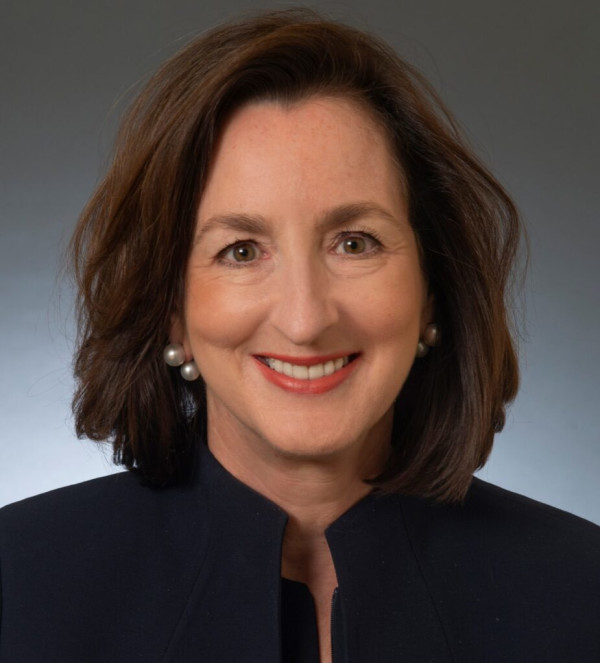Bankers should be pillars of society believes BNY Mellon

BNY Mellon’s Catherine Keating feels a huge sense of fulfilment in helping families reach their investment goals and says this need for advice is only going to increase
One of Catherine Keating’s missions – and she has several – is convincing younger generations that working in wealth management is an exciting profession.
“I was born and raised in the Washington DC area,” recalls the leader of BNY Mellon’s Investor Solutions and Wealth Management businesses, enjoying her third decade working for financial firms. “I didn’t know a single person working in our industry. I knew wonderful public servants, doctors, lawyers, journalists and people buying real estate. But I don’t recall anyone in the neighbourhood – not one – making a career in financial services.”
The need for financial professionals today – she reckons – is even more urgent, given company pensions have largely been consigned to history, highlighting the importance of wealth managers in retirement planning. “There is huge satisfaction to be gained from people and markets, that can stimulate you every day,” says the plain-speaking banking boss, an attorney by training, now responsible for more than $264bn of client assets.
“We’re building relationships with families and helping them reach their goals. It’s a wonderful business, which offers a great career,” says Ms Keating. “The future health of our economy will depend on people receiving quality financial advice.”
Much of Ms Keating’s inspiration to learn about managing investments came from her mother. “I was the oldest of three kids when we lost our father, very unexpectedly, and I watched her, newly widowed at 32, go back to school, get her graduate degree, buy a car and sign up for her first credit card,” remembers Ms Keating.
“I saw her join an investment club and learn how to manage our family’s money. We had our own social media in those days, and it was the church bulletin,” which allowed her mother to create a network within the community to meet friends and eventually a new partner.
All change
These early experiences of investment clubs led Ms Keating to the belief that wealth managers can help form the bedrock of today’s fast-evolving post-industrial US society. “For several years we have been seeing a fundamental change in how people save for retirement,” she believes. “When I started my career, most clients worked for a company and retired with a pension for the rest of their lives, plus the savings they accumulated with their wealth manager.”
Fast forward to today and companies no longer provide pension plans. Wealth managers are replacing them as navigators of their clients’ financial future, making sophisticated institutional investment techniques available to high net worth families.
This trend has played into the hands of firms such as Northern Trust, JP Morgan and BNY Mellon, which host institutional investment divisions alongside wealth management units. “We are a deeply institutional firm, safeguarding $43tn of financial assets for institutional clients, and a $1.9tn asset and wealth manager,” which includes affiliate brands such as Newton Investment Management, Dreyfus and Insight Investment. “This means I see institutional disciplines here every single day.”
She is clearly on top of institutional investment techniques, having previously headed up JP Morgan’s investment management arm in the Americas, as well as its US private bank. Among the disciplines she favours is investing in alternative assets. “First you need to step back and ask: what am I trying to accomplish with this portfolio? If it is growth, you need to look at private equity and venture capital,” she says, adding that historically, the bank’s private equity investments have delivered 3 to 5 per cent of annualised returns over public market indices.
“If you want more income, then look at private credit or real estate, if you want to dampen volatility, then you look at absolute return hedge funds. We step back and do this institutional portfolio process the same as any CIO would do it. And we find a role for all of these things in client portfolios.”
This notion of providing a pathway to previously impenetrable asset classes is central to her vision. “Our mission is to bring institutional practices and performance to individual clients,” she says.
“We’re talking about a $3.5tn market in the US, which is very hard for any individual investor to access on their own,” she says. “But there are ways to make it more reachable to more people over time.”
Tech as an enabler
Using institutional technology to make these techniques available to private clients is key to this brave new world, which Ms Keating describes. “You need good technology to scale this framework,” she says. “We looked at our clients and saw that every one of us has a liability. One of the challenges of wealth management is that everyone gets to define their own goal. We concluded that the only way to scale up and manage this approach was to develop our own technology.”
BNY Mellon set-up the specialist digital assets unit in February of 2021. “We considered the cryptocurrency segment today in the same way people saw the internet in the 1990s: it was new, not readily accessible and nobody knew whether they could trust it. It took time to become widely accessible and trusted as a source of information,” Ms Keating remembers.
Today, the bank takes a similar approach to digital assets and associated blockchain technology. “Over time, it will have a tremendous impact on transfers and keeping of records, facilitating asset managers and custodians, who need to keep track of who owns what in their funds.
“We can help investors take positions in assets that have been hard to access for individuals,” with 120m households in the US now holding assets they need to be managed by the financial industry, she says. This approach will particularly suit assets such as mortgage-backed securities, which can be sliced up into pieces for the wealth management market.
The next stage in Ms Keating’s plan involves rolling out this US blueprint in foreign markets. Her responsibilities include accessing non-US wealth management markets through partnerships with other asset managers and distributors. She admits that currently, there is “no scale in this business”.
While the firm has “feet on the street” in 35 countries, the only real clue she gives about geographical priorities for recruiting wealth advisers is that investment will focus on “growth markets” in developing countries.
“Look at this country, where the consumer drives 70 per cent of our economy,” she says, referring to her US home market.
“What we don’t talk about as often is that the individual investor is responsible for two-thirds of professionally managed investment assets. The retail market is now so much larger than the institutional and growing faster. You see that trend to a different degree all around the world, especially in many emerging economies, where there never was a pension plan.”
Soft power
Seen as a leader, who having studied economics, feels most comfortable discussing inflation and equity valuations, Ms Keating is fast realising the softer, psychological skills needed in wealth management are becoming just as important as her rational economic approach.
As the Covid pandemic began to ravage the US in early 2020, she prioritised communication between investment strategists and advisers, beginning each morning with a division-wide webcast for global client teams to discuss insights and prepare for the day ahead.
“There is a lot of emotion related to money and this business is very personal to me,” she says. “Boosting our clients’ financial success in global markets needs the maths and science of institutional discipline, but also the understanding and empathy of dealing with families, all of whom are different. It take both quantitative and qualitative approaches and we excel at that.”
Advice, she has come to believe, is now at least equivalent to investment prowess and clients have agreed they are willing to pay for this, backing her latest incarnation of the wealth management business model.
“Six or seven years ago, we debated whether there was really a role for physical advice in the future, because everything would be robotic and automated,” says Ms Keating. “But now we are realising there is a real role for the adviser going forward.”



